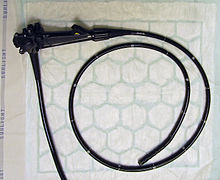Colonoscope
A colonoscope (also: colonoscope ) is a device for performing a colonoscopy , a continuous optical display of the mucous membrane of the large intestine ( colon ) and the terminal ileum .
The colonoscope is a flexible endoscope and consists of a flexible tube with an optical system (light source and camera) that is pushed through the anus into the intestine. The hose has only low restoring forces and is used to transmit the force between the examiner and the optics chip. It houses fiber optic cables for illumination, image transmission cables and cables, channels for rinsing water and suction as well as a working channel for auxiliary equipment such as forceps, syringe needles, clips and loops. Some colonoscopes have a technical device in the middle section of the device for changing the stiffness (variable stiffening). This can facilitate the passage in the case of loop formation in the intestine. The doctor can use the colonoscope to view the inside of the large intestine, take tissue samples if necessary ( biopsy ) or perform minor surgical interventions such as the removal of tissue growths ( tumors ) or the removal of intestinal polyps ( polypectomy ).
Classification according to nomenclature systems :
- UMDNS Code: 10-950 (Universal Medical Device Nomenclature System UMDNS )
- GMDN Code: 10951 (Global Medical Device Nomenclature System GMDN )
Technical aids
There are different attachments for a colonoscope. These attachments help to improve the inspection of the bowel. The attachments include, among other things, transparent plastic caps or innovative attachments with side arms (e.g. ENDOCUFF VISION ® ). Attachments with transparent plastic caps improve vision by creating a greater distance between the camera and the intestinal lumen. Attachments with side arms can also improve vision by smoothing out the intestinal folds. At the same time, the foldable side arms also ensure more controlled control through more stability while the colonoscope is withdrawn from the intestine. This is important because colonoscopes often slip too quickly when withdrawing, and clinical changes may be missed.
literature
- Helmut Messmann: Colonoscopy teaching atlas. Georg Thieme Verlag, 2004. ISBN 3-131-36441-6
Web links
Individual proof
- ^ Todd Baron: The variable stiffness colonoscope: a scope for all seasons? In: American Journal of Gastroenterology. AJG, 2002, accessed on January 11, 2018 .
